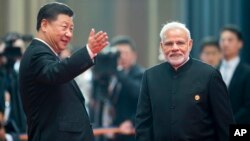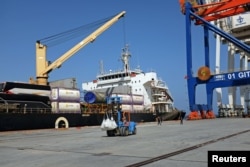China has acknowledged it is trying to persuade India to improve ties with neighboring Pakistan and jointly combat regional terrorism instead of fighting with each other.
The deputy chief of the Chinese Embassy in Islamabad, Lijian Zhao, made the remark Friday while addressing a rare, wide-ranging news conference in the Pakistani capital.
“The Pakistan-India relationship is now at a new low. China has been trying to work with India to ask them to improve relationship with Pakistan. This is in the interest of both countries,” Zhao said.
The Chinese diplomat added that both countries needed to work together for the economic betterment of their people rather than wasting resources developing conventional and nuclear weapons.
He said Beijing’s recent decision to work with New Delhi to jointly identify and implement an economic project in Afghanistan was also part of Chinese diplomatic efforts to ease regional tensions and promote economic cooperation.
Zhao tried to allay Pakistani concerns about Indian involvement in Afghanistan.
“Pakistan is very much sensitive to any role given to India in Afghanistan. We are trying to work only on some projects, like training of their [Afghan] civil servants, some very small projects. It is just some baby steps, and you don’t need to worry about that,” noted the Chinese diplomat.
Islamabad alleges that New Delhi is using its growing influence, particularly in the Afghan security establishment, to destabilize Pakistan by supporting cross-border terrorist attacks, charges that Afghan and Indian officials deny.
Chinese President Xi Jinping, in a meeting with Indian Prime Minister Narendra Modi this month in Qingdao, agreed that they would jointly work on identifying a specific project initially in the area of capacity building in Afghanistan.
The agreement came on the sidelines of the Shanghai Cooperation Organization (SCO) summit on June 9. Pakistan and India simultaneously joined the China-led grouping in 2017, a move analysts said could help reduce tension between the rival nations and promote regional economic cooperation.
China-Pakistan corridor deal
Zhao also addressed reported concerns and allegations that billions of dollars of unprecedented Chinese investment in Pakistan in the last four years was pushing the cash-strapped nation into a “China debt trap.”
Zhao blamed “fake economists” for spreading what he said was “totally baseless propaganda” against the bilateral economic cooperation and China's global Belt and Road Initiative in general.
The joint project, known as the China-Pakistan Economic Corridor, or CPEC, has already brought $19 billion in Chinese investment to Pakistan, where it is being used to build roads, ports, power plants and special economic zones.
Chinese envoy Zhao said that 22 out of 43 “early harvest” projects under CPEC had been or were being completed.
He explained that of the total $19 billion China had invested so far, $13 billion was in direct foreign investment in the energy sector and it had already added more than 11,000 megawatts of electricity to the national grid, helping Pakistan overcome its critical power shortages.
The money for those projects, he said, is being borrowed from mostly Chinese commercial banks, and the investors are either individual Pakistani or Chinese companies or private joint ventures.
“The Pakistani government is not borrowing a single dollar to complete these projects. … So there is no responsibility on the Pakistani government to return the so-called debt or the commercial loans. So if somebody claims that CPEC is a debt trap, remember to call them fake economists,” Zhao said.
The rest of the $6 billion has been given to Pakistan as a “soft loan” with 2 percent interest, and the government will end up returning around $7.4 billion over 20 years, said the Chinese diplomat. More than 70,000 Pakistanis are working on the projects.
The total Chinese investment under CPEC over the next 15 years is estimated to be more than $60 billion, and it is expected to create 500,000 to 800,000 jobs in Pakistan.
The massive project aims to ultimately connect landlocked western China to the Chinese-operated southern Pakistani port of Gwadar on the Arabian Sea, enabling Beijing to conduct its international trade through a much shorter and secure route.





